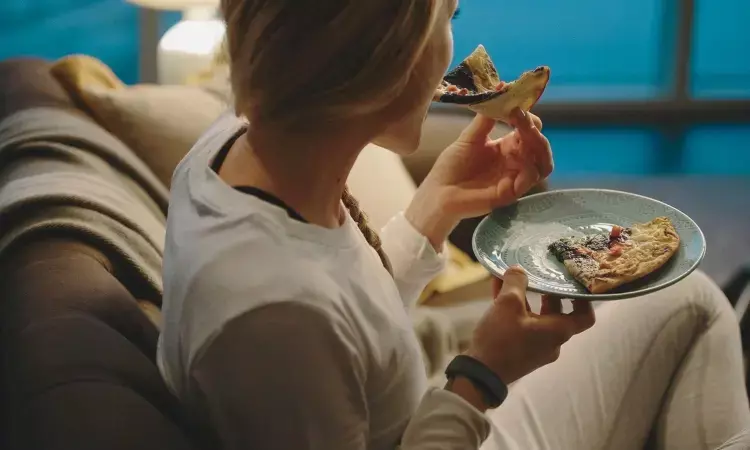- Home
- Medical news & Guidelines
- Anesthesiology
- Cardiology and CTVS
- Critical Care
- Dentistry
- Dermatology
- Diabetes and Endocrinology
- ENT
- Gastroenterology
- Medicine
- Nephrology
- Neurology
- Obstretics-Gynaecology
- Oncology
- Ophthalmology
- Orthopaedics
- Pediatrics-Neonatology
- Psychiatry
- Pulmonology
- Radiology
- Surgery
- Urology
- Laboratory Medicine
- Diet
- Nursing
- Paramedical
- Physiotherapy
- Health news
- Fact Check
- Bone Health Fact Check
- Brain Health Fact Check
- Cancer Related Fact Check
- Child Care Fact Check
- Dental and oral health fact check
- Diabetes and metabolic health fact check
- Diet and Nutrition Fact Check
- Eye and ENT Care Fact Check
- Fitness fact check
- Gut health fact check
- Heart health fact check
- Kidney health fact check
- Medical education fact check
- Men's health fact check
- Respiratory fact check
- Skin and hair care fact check
- Vaccine and Immunization fact check
- Women's health fact check
- AYUSH
- State News
- Andaman and Nicobar Islands
- Andhra Pradesh
- Arunachal Pradesh
- Assam
- Bihar
- Chandigarh
- Chattisgarh
- Dadra and Nagar Haveli
- Daman and Diu
- Delhi
- Goa
- Gujarat
- Haryana
- Himachal Pradesh
- Jammu & Kashmir
- Jharkhand
- Karnataka
- Kerala
- Ladakh
- Lakshadweep
- Madhya Pradesh
- Maharashtra
- Manipur
- Meghalaya
- Mizoram
- Nagaland
- Odisha
- Puducherry
- Punjab
- Rajasthan
- Sikkim
- Tamil Nadu
- Telangana
- Tripura
- Uttar Pradesh
- Uttrakhand
- West Bengal
- Medical Education
- Industry
Late Night Calories May Harm Glucose Metabolism in Prediabetes and Early Type 2 Diabetes: Study Finds

USA: Late eating (LE) is associated with poorer glucose tolerance compared to early eating (EE), regardless of body weight, fat mass, daily energy intake, and diet composition, a recent study has found. The findings were published online in Nutrition & Diabetes on October 25, 2024
Dietary interventions are key in preventing and treating type 2 diabetes (T2D). Total energy intake, meal composition, and timing influence glucose excursions. Late eating is associated with poorer glucose metabolism, higher BMI, increased body fat, and greater energy intake, often from processed foods. Consuming more energy later in the day can prolong postprandial glucose excursions and cause circadian misalignment, further impairing glucose metabolism.
Against the above background, Blandine Laferrère, Division of Endocrinology, Nutrition Obesity Research Center, Diabetes Research Center Columbia University Irving Medical Center, New York, NY, USA, and colleagues examine how habitual late calorie intake affects glucose metabolism in adults with overweight or obesity and those with diet- or metformin-controlled prediabetes or type 2 diabetes, independent of body weight, fat mass, energy intake, or diet composition.
For this purpose, the researchers classified participants (n = 26) as Later Eaters (LE) if they consumed ≥45% of their daily calories after 5 pm and as Early Eaters (EE) if they did not, based on a two-week assessment of daily caloric intake.
The researchers reported the following findings:
- Later Eaters (LE) did not differ from Early Eaters (EE) in anthropometrics or total daily energy intake.
- LE consumed significantly more carbohydrates and fats after 5 pm compared to EE.
- Fasting glucose, insulin, and C-peptide levels were similar between groups.
- LE exhibited higher glucose concentrations during an oral glucose tolerance test, even after adjusting for body weight, fat mass, energy intake, and diet composition.
- The elevated glucose concentrations in LE persisted when participants with type 2 diabetes were excluded.
- After adjusting for diabetes status, LE showed significantly higher glucose concentrations at 30 and 60 minutes during the glucose tolerance test.
The exploratory study supports previous findings that late calorie consumption is linked to poorer glucose tolerance. Late eating is associated with increased intake of calories, primarily from carbohydrates and fats, which may prolong evening postprandial glucose excursions and contribute to impaired glucose tolerance.
"Our findings indicate that the association between late eating and poorer glucose metabolism is not attributable to higher BMI, body fat, or overall diet composition. Future studies are needed to confirm these results and further investigate the impact of both the composition and timing of the last meal on overnight glucose levels and glucose tolerance," the researchers concluded.
Reference:
A., D., Santos Baez, L. S., Popp, C. J., Borhan, R., Manoogian, E. N., Panda, S., Cheng, B., & Laferrère, B. (2024). Late eating is associated with poor glucose tolerance, independent of body weight, fat mass, energy intake and diet composition in prediabetes or early onset type 2 diabetes. Nutrition & Diabetes, 14(1), 1-4. https://doi.org/10.1038/s41387-024-00347-6
Dr Kamal Kant Kohli-MBBS, DTCD- a chest specialist with more than 30 years of practice and a flair for writing clinical articles, Dr Kamal Kant Kohli joined Medical Dialogues as a Chief Editor of Medical News. Besides writing articles, as an editor, he proofreads and verifies all the medical content published on Medical Dialogues including those coming from journals, studies,medical conferences,guidelines etc. Email: drkohli@medicaldialogues.in. Contact no. 011-43720751


